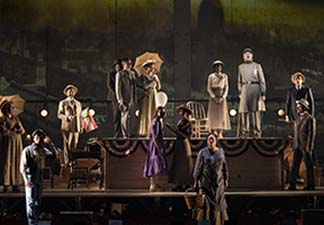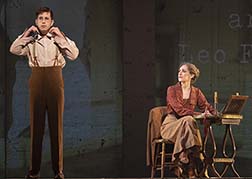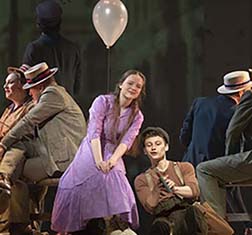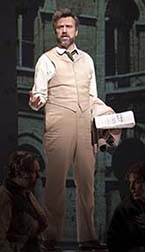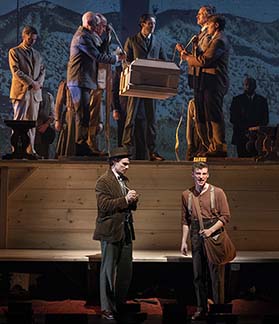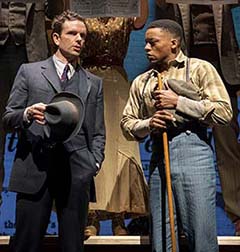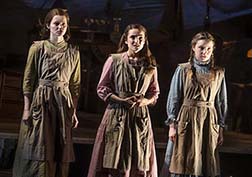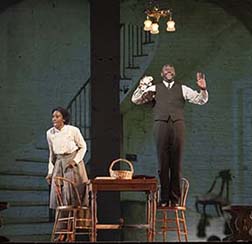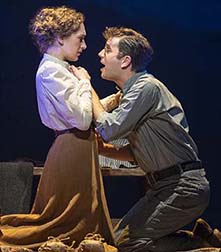
Lucy Komisar
|
“Parade,” a gripping
musical of Georgia trial & lynching of NY Jew Leo Frank “Parade”
“Parade” is a tragedy about the 1913 trial and 1915 lynching of Leo Frank, a Jew, in a Georgia still smarting from the loss of the Civil War. Fifty years later in Atlanta their descendants chant, “We gave our lives for Georgia” and wave Confederate flags. The few blacks on the scene are discomforted. The play is vivid, riveting and never maudlin. And why would a Jew move to Atlanta? Because his uncle offered him a good office job in his pencil factory. He’s not happy there. Putting together his comments: “It is not good being in the South…It’s like they never joined civilization…The Jews are not like Jews.”
ants to be in Brooklyn “with people who look and think like I do.” As Leo, Ben Platt projects a mild personality and makes you see that he doesn’t realize how venal and dangerous these white Southerners are. The visuals do not betray the dark mood. Costumes are gray, beige, pale blue or pink. The production numbers are invigorating, the music like an oratorio or operetta when it isn’t foot-tapping country. The choreography by Lauren Yalango-Grant and Christopher Cree Grant is smart, based on dances of the time, and pleasing.
ctor Michael Arden makes the story gripping without being tear-jerking. But throughout, the black and white photos of the real persons of the events are projected on the red brick backdrop, as if photos from the grave. Frankie (Jake Pederson), a youth of 15 or 16, had been coming on to young girls, including Mary Phagan (Erin Rose Doyle). The horror becomes real when the night watchman checks the basement of the factory and finds the body of 13-year-old Mary. This is not a “who-done-it.” At Mary’s funeral, Frankie thinks, “God forgive me what I think, God forgive me what I wish right now.”
The events are real, but the dialogue is invented. Still, you believe every word. The play moves inexorably to tragedy through the evil doings of real persons who are indeed the historical and sometimes present villains of the South. And sometimes the North. First, they detain Newt, the black watchman (Eddie Cooper). But the newspaper editor Thomas Watson (the excellently sleazy Manoel Felciano), in a pretentious vested suit, says, “Hangin’ another nigra ain’t enough this time. We gotta do better.” His reporter Brett Craig (Jay Armstrong Johnson, who captures his facile immorality) will make his career on the fake story. (As many mainstream media reporters do today, viz Russiagate.)
And the corrupt prosecutor Dorsey (Paul Alexander Nolan): “It’s in his hands. See how he rubs ‘em both together. Like he’s tryin’ to get ‘em clean? It’s in his eyes. Wonder why he stares at the floor. And he won’t look you straight in the face? Office Ivey (Jackson Teeley) says, “But we got no evidence.” Dorsey: “Look at those clothes and that big fancy talk. Look at him sweatin’ from ev’ry pore! Can’t you see him just standin’ there, watchin’ that little girl bleed? …What more do you need?” Ivey: “An eyewitness wouldn’t be bad.”
That is arranged. They will find lots of people to lie, often people the police have something on. Lies about him frequenting a house of prostitution and being homosexual. No note of the contradiction. Or people who are black and fear retribution. Jim Conley (Alex Joseph Grayson), who worked at the factory, had been on a chain gang. He says, “He’d tell me, “Jim, you watch the door, I got a lady comin’.” The Franks’ maid also invents stories.
Young white girls working in the factory lie. Platt is terrific as the imagined Frank enticing young girls to come into his office. Why do the workers lie? Is it mass craze? Fear? It’s orchestrated by the local powers. The demagogic editor Watson addresses “Christians and Georgians.” And at the trial, the girl’s mother (Kelli Barrett) spits out “Jew!”
The excellent Micaela Diamond as Frank’s wife Lucille, who speaks with a bit of Southern twang and identifies as Southern, starts the story frightened. She wants to go out of town. Then she gets toughness and fights for him. Diamond has a beautiful emotive soprano as she sings,” “You don’t know this man.” After the arrest, there is a world of attention. Even Henry Ford calls for Frank’s freedom. An add to the original script, a black couple (Courtnee Carter and Douglas Lyons) servants of the governor, sing, “I can tell you this, as a matter of fact, That the local hotels wouldn’t be so packed if a little black girl had gotten attacked – … there’s a black man, swingin’ in every tree…They never say, “why? Why? Why?”
To keep the mood shifts, the scene at the governor’s mansion ballroom has jazzy dancing to showcase the villains and the brave Lucille Frank. Governor Slaton (Sean Allan Krill), with more integrity than the others, realizes the trial was a sham. He discovers the prosecutor coached witnesses, forced lies. He visits Conley on the chain gang. Grayson stands out in a jazzy “Rise like sunshine” R&B song. In 1915, recalling another governor, who killed Jesus, Staton commutes Frank’s sentence to life, knowing it’s the end of his political career. His wife approves.
A high point is the Franks’ duet “It is not over yet” at the chilling prison farm, the verdant scenery projected on the backdrop. The end is history. Injustice rewarded, prosecutor Dorsey was elected governor and editor Watson senator. It would take half a century to begin to wipe out the stain. This production is a moving epitaph. Playwright Alfred Uhry was born in Atlanta, Georgia to a Jewish middle-class family. After graduating from Brown University, he moved to New York to write for musical theatre. “Parade” premiered on Broadway in 1998. Visit Lucy’s website http://thekomisarscoop.com/ |
| museums | NYTW mail | recordings | coupons | publications | classified |
